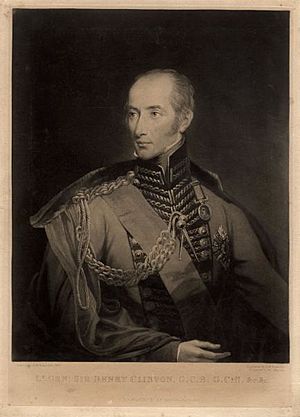Henry Clinton (British Army officer, born 1771) facts for kids
Quick facts for kids
Sir Henry Clinton
|
|
|---|---|
 |
|
| Born | 9 March 1771 |
| Died | 11 December 1829 (aged 58) |
| Allegiance | |
| Service/ |
|
| Rank | Lieutenant-General |
| Battles/wars | French Revolutionary Wars Peninsular War |
| Awards | Knight Grand Cross of the Order of the Bath Knight Grand Cross of the Royal Guelphic Order |
Lieutenant-General Sir Henry Clinton (born March 9, 1771 – died December 11, 1829) was a British Army officer. He became a high-ranking general during the Napoleonic Wars.
Henry Clinton came from a family of soldiers. His older brother was William Henry Clinton. His father, also named Sir Henry Clinton, was the British Commander-in-Chief in North America during the American Revolutionary War. His grandfather, George Clinton, was a top naval officer called an Admiral of the Fleet.
Contents
Early Military Career
Henry Clinton first joined the navy as a midshipman in 1786. He served on a ship called HMS Salisbury. However, he suffered from severe seasickness. Because of this, he left the navy after three years.
In 1787, he became an army officer. He served in a campaign in Flanders, helping the Duke of York. He was promoted to lieutenant colonel in 1795. The French captured him, and he was a prisoner for about a year.
Later, he worked as a special officer with the Russian army in Italy in 1799. From 1802 to 1805, he was a senior officer in India. In 1805, he was the British military representative with the Russian army at the Battle of Austerlitz. He also commanded the army base in Syracuse, Sicily, from 1806 to 1807.
Becoming a Member of Parliament
In 1808, Henry Clinton became a Member of Parliament (MP) for a place called Boroughbridge. An MP is someone elected to represent people in the country's government. He held this position for ten years.
Fighting in the Peninsular War
During the Peninsular War (1808–1814), Henry Clinton played an important role. He was a senior officer for Sir John Moore during the campaign and Battle of Corunna. In 1810, he was promoted to major-general.
He then commanded an infantry division, which is a large group of soldiers, under the Marquess of Wellington. Wellington later became the famous Duke of Wellington. Clinton's division, the 6th Division, was very important at the Battle of Salamanca. They helped defeat a French counterattack. He also led his division during the Siege of Burgos. For his actions in the Vitoria campaign, he received a high award called the Knight Grand Cross of the Order of the Bath (GCB).
He continued to lead his division in other important victories. These included the battles of the Nivelle, the Nive, Orthez, and Toulouse. At the end of the Peninsular War, he was promoted to lieutenant general. He also received another award called the Army Gold Cross.
The Battle of Waterloo
In 1815, Sir Henry Clinton was a key commander at the famous Battle of Waterloo. He led the 2nd Division, which was kept in reserve by Wellington. This meant his troops were ready to support other parts of the army.
His division included several brigades of British, German, and Hanoverian soldiers, along with artillery. His troops played a crucial part in the battle's end. They helped to defeat and chase away Napoleon's elite Imperial Guard.
Later Life and Legacy
After the wars, in 1815, he became the Colonel of the Buffs (Royal East Kent Regiment), a position he held until he died.
Sir Henry Clinton passed away on December 11, 1829, at his home in Ashley, Hampshire. He was married to Susan Charteris, but they did not have any children.
Places Named After Him
- Clinton, Ontario, a town in Canada, is named in his honor.
 | Toni Morrison |
 | Barack Obama |
 | Martin Luther King Jr. |
 | Ralph Bunche |

